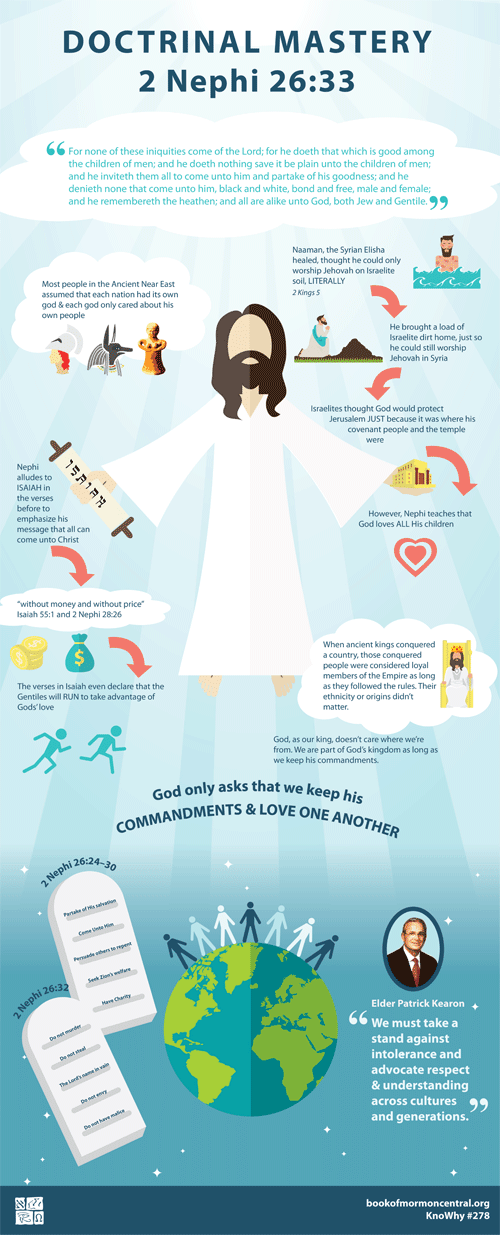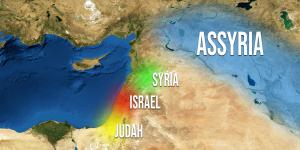You are here
Why Did Nephi Say That All Are Alike Unto God?

2 Nephi 26:33
Context and Content
Nephi stated that “all are alike unto God, both Jew and Gentile.” This comment comes from Nephi’s last recorded speech to his people, and probably would have been shocking to them. Most people in the ancient Near East, where Nephi and his brothers were from, assumed that each nation had its own god, and that each god only cared about his own people (Judges 11:24).1
Naaman, the Syrian captain that Elisha healed, thought he could only worship Jehovah on Israelite soil, literally. He loaded up two of his mules with Israelite dirt, so he could still worship Jehovah when he got home (2 Kings 5:17). Many people in Jerusalem during this time thought that God would protect Jerusalem simply because it was where His people and temple were (Jeremiah 7:4).2 In contrast, 2 Nephi 26:33 shows that God values and loves all His children.
Doctrinal Mastery 2 Nephi 26:33 Infographic by Book of Mormon Central
Nephi alluded to Isaiah while teaching this principle. In 2 Nephi 26:25 the Lord said, “Come unto me all ye ends of the earth, buy milk and honey, without money and without price.” This is very similar to Isaiah 55:1, “Every one that thirsteth, come ye to the waters, and he that hath no money; come ye, buy, and eat; yea, come, buy wine and milk without money and without price.”3
Isaiah 55:5 clarifies that this invitation is open to everyone, both Jews and Gentiles, “Behold, thou shalt call a nation that thou knowest not, and nations that knew not thee shall run unto thee because of the Lord thy God, and for the Holy One of Israel.”4 This verse from Isaiah shows that when God “inviteth them all to come unto him” the gentiles will “run” to take advantage of the offer.
In the ancient Near East, it was common for kings of one country to take over neighboring countries. When they did this, they simply commanded the people they conquered to keep certain conditions.5 When the subjects kept these conditions, they were considered loyal members of the empire, regardless of where they were from or what they looked like.6 This verse reminds all who read it that God places high value, not on ethnicity or national origin, but on whether people keep the conditions He has laid down in order to be part of His kingdom. Anyone who keeps the conditions God has laid down is part of the kingdom of God.7
Doctrines and Principles
Yet, if God doesn’t care about where someone is from or what ethnicity they are, what does He care about? Simply that people do what He asks.8 Nephi led up to verse 33 by commanding people what they should do and listing off iniquities that people should not commit (2 Nephi 26:24–32). He commands all people to “partake of his salvation” (v. 24), to come unto him (v. 25), to “persuade all people to repentance” (v. 27), to “partake of his goodness” (v. 28), to seek “the welfare of Zion” and not to seek “gain and praise of the world” (v. 29), and for all to “have charity” (v. 30).
Nephi then gave a list of further admonitions, which in ways echo the Ten Commandments but are stated in a kind, admonishing mood: “And again, the Lord God hath commanded that men should not murder, that they should not lie; that they should not steal; that they should not take the name of the Lord their God in vain; that they should not envy; that they should not have malice; that they should not contend one with another; that they should not commit whoredoms; and that they should do none of these things” (2 Nephi 26:32).
He then stated that “none of these iniquities come of the Lord” (2 Nephi 26:33). This list of iniquities is what people need to reject if they want to be like God who “doeth that which is good among the children of men.” Rejecting these vices and becoming more like God is how all people, bond and free, male and female, can “come unto him and partake of his goodness.” God will accept and bless anyone who does this, regardless of where they are from or what they look like.9
God loves each of His children perfectly and invites all to come unto Him, and in this way all are alike unto Him.10 This is central to who God is. He is not like the false gods of other countries that were only thought to be worried about their own people.11 Even with their differences, God loves everyone on earth and wants them all to keep His commandments and join with Him. This is the main point Nephi was making to his people. He was showing his brothers that Christ “manifesteth himself unto all those who believe in him ... yea, unto every nation, kindred, tongue, and people ... according to their faith” (2 Nephi 26:13).
In a world where some people hate others because of how they look, what language they speak, or what country they are from, Nephi’s words remind the modern reader of the love of God.12 Christ “loveth the world, even that he layeth down his own life that he may draw all men unto him. Wherefore, He commandeth none that they shall not partake of His salvation” (2 Nephi 26:24). He does not “cry unto any, saying: Depart from me ... but he saith: Come unto me all ye ends of the earth, buy milk and honey, without money and without price” (v. 25). He has made salvation open and “free for all men” (v. 27) and women. He simply asks his people to have charity and to “persuade all men to repentance” (v. 27).
Elder Patrick Kearon said, “We must take a stand against intolerance and advocate respect and understanding across cultures and traditions.”13 This is what Nephi also taught. God loves everyone, regardless of where they are from, what they look like, or what language they speak. If people wish to be like Him, they must do the same.
Further Reading
Linda K. Burton, “‘I Was a Stranger’,” Ensign, May 2016, 13–15.
Patrick Kearon, “Refuge from the Storm,” Ensign, May 2016, 111–114.
President Gordon B. Hinckley, “The Need for Greater Kindness,” Ensign, May 2006, online at lds.org.
- 1. Mark S. Smith, The Early History of God: Yahweh and Other Deities in Ancient Israel, 2nd ed. (Grand Rapids, MI: William B. Eerdmans, 2002), 60–61.
- 2. A. R. Pete Diamond, “Jeremiah,” in Eerdmans Commentary on the Bible, ed. James D. G. Dunn and John W. Rogerson (Grand Rapids, MI: Wm. B. Eerdmans, 2003), 562.
- 3. S. Michael Wilcox, “Nephi’s Message to the ‘Gentiles’,” in Second Nephi, The Doctrinal Structure, ed. Monte S. Nyman and Charles D. Tate Jr., The Book of Mormon Symposium Series, Volume 3 (Provo, UT: Religious Studies Center, Brigham Young University, 1989), 280.
- 4. Margaret Barker, “Isaiah,” in Eerdmans Commentary, 535.
- 5. James L. Kugel, How to Read the Bible: A Guide to Scripture, Then and Now (New York, NY: Free Press, 2007), 426.
- 6. Kugel, How to Read the Bible, 426.
- 7. Kugel, How to Read the Bible, 426; Jon D. Levenson, Sinai & Zion: An Entry into the Jewish Bible (New York, NY: HarperOne, 1987).
- 8. Joseph Fielding McConkie and Robert L. Millet, Doctrinal Commentary on the Book of Mormon, 4 vols. (Salt Lake City, UT: Bookcraft, 1987–1992), 1:312.
- 9. McConkie and Millet, Doctrinal Commentary, 1:308.
- 10. Doctrinal Mastery: Core Document (Salt Lake City, UT: The Church of Jesus Christ of Latter-day Saints, 2016), online at lds.org.
- 11. Hugh Nibley, The Prophetic Book of Mormon, The Collected Works Hugh Nibley, Volume 8 (Salt Lake City and Provo, UT: Deseret Book and FARMS, 1989), 529.
- 12. Brant A. Gardner, Second Witness: Analytical and Contextual Commentary on the Book of Mormon, 6 vols. (Salt Lake City, UT: Greg Kofford Books, 2007), 2:373.
- 13. Patrick Kearon, “Refuge from the Storm,” Ensign, May 2016, 113.
KnoWhy Citation
Related KnoWhys
Subscribe
Get the latest updates on Book of Mormon topics and research for free








